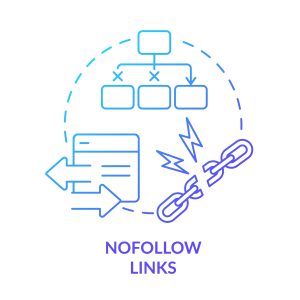How Nofollow Links Impact SEO and When to Use Them
From building credibility to driving traffic, links from other sites signal to search engines that your website is a valuable resource. But not all links are the same, especially when it comes to “nofollow” links. Unlike regular links, nofollow links don’t pass on SEO value directly. You might wonder, then, how they fit into an effective SEO strategy!
At Now Media Group, our skilled SEO specialists will help you understand what nofollow links are, why they matter, and how to use them strategically to boost your site’s overall performance. For more information about nofollow links, contact Now Media Group today by calling (858) 333-8950.
What Are Nofollow Links?
 Nofollow links are simply hyperlinks with a special tag—rel=”nofollow”—that tells search engines not to follow that link. This tag lets search engines know that, while the link is still present on the webpage, it shouldn’t pass any “link equity” or SEO value.
Nofollow links are simply hyperlinks with a special tag—rel=”nofollow”—that tells search engines not to follow that link. This tag lets search engines know that, while the link is still present on the webpage, it shouldn’t pass any “link equity” or SEO value.
Originally, Google introduced nofollow links to combat spam, specifically with user-generated content (think comment sections or forums). Today, nofollow tags have expanded to be useful in various scenarios, which we’ll explore in this blog.
Why Use Nofollow Links?
There are a few main reasons to use nofollow links on your website:
- Avoid Spam and Low-Quality Links: Nofollow tags were initially created to handle low-quality links and spammy content. If you allow guest comments on your site, for example, adding a nofollow tag to links in those comments is a smart way to keep search engines from associating your site with potential spam or untrustworthy sites.
- Sponsored and Paid Links: Google and other search engines want transparency in advertising. If a link is sponsored or paid for, adding a nofollow tag lets search engines know that it’s an ad or paid content. Not only does this help with transparency, but it also keeps your SEO strategy compliant with Google’s guidelines.
- External Links You Don’t Endorse: If you reference a website but don’t want to fully endorse it or pass SEO value, a nofollow tag lets you link to it without “vouching” for its quality. This is especially helpful for content on competitors’ websites or sites with potentially questionable credibility.
- Control Your Website’s Link Equity: Nofollow links can help you strategically manage your site’s link equity, or “link juice.” By using nofollow tags on less critical links, you can conserve link equity for more valuable, internal links that support your main SEO goals.
Do Nofollow Links Impact SEO?
For years, SEO experts believed that nofollow links held no influence over a website’s rankings or SEO. Today, we know that while they may not pass link equity, nofollow links do contribute indirectly to SEO. Here’s how:
Boosting Brand Visibility
When other websites, especially high-traffic or high-authority sites, link to you—even with a nofollow link—your brand’s visibility can still get a major boost. These links can drive traffic directly to your site, encouraging new visitors to explore your content, products, or services. Plus, more mentions from reputable sites enhance your brand’s authority over time, which can positively influence SEO in the long run.
Diversifying Link Profile
A healthy SEO strategy includes a diverse link profile—meaning a mix of follow and nofollow links from a variety of sources. A website that only has followed links might appear unnatural to search engines. By adding nofollow links, you create a more organic link profile that can help avoid any appearance of manipulative linking practices.
Potential Indirect Influence on Rankings
Although nofollow links may not directly impact rankings, their value lies in other areas. For instance, high-quality content linked by nofollow links on credible sites can help build reputation and authority. Additionally, while search engines may not pass direct link equity through nofollow tags, the visibility from traffic boosts and social shares these links create may indirectly support SEO.
Nofollow Links: When to Use & Avoid Them
Knowing when to use nofollow links can help you create a responsible linking strategy and stay within search engine guidelines.
When to Use Nofollow Links
- User-Generated Content (UGC): Avoid passing link value in blog comments or forum links where the content is user-generated.
- Sponsored Content: For transparency, mark all paid and sponsored links as nofollow.
- External References You Don’t Fully Endorse: If linking to a source that may not align with your brand or has questionable content, use nofollow.
When to Avoid Nofollow Links
- Internal Links: There’s no need to nofollow internal links, as they help build site authority and connect pages within your website for a stronger internal linking structure.
- Trusted References: If you’re linking to a reputable resource, such as a trusted website or well-known publication, there’s no need for a nofollow tag.
Nofollow Links, An Essential Part of Your SEO Toolkit
Nofollow links may not pass link equity, but they still hold real value. They help prevent spam, add transparency for sponsored content, and allow strategic link management. By using nofollow links wisely, you can protect your SEO strategy from penalties while still harnessing the indirect benefits of increased traffic and brand authority.
At Now Media Group, we understand how to balance follow and nofollow links for the best results, ensuring your website remains both competitive and compliant with search engine guidelines. Speak to one of our SEO professionals today by calling (858) 333-8950.
